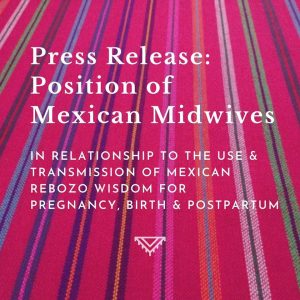In March 2021, a petition was created by a group calling for non-indigenous and white people to be banned from using or teaching rebozo techniques.
This was met by a response from 50 Birthworkers and traditional Mexican Midwives in regard to that petition and was shared by Mexican midwife Naoli Vinaver who can be found on Instagram @naoli.vinaver.oficial or her website:
This is what Naoli wrote:
Some days ago a petition arose calling to remove the teaching of the Mexican Rebozo from doula & birth organizations as well as trying to limit who can or cannot teach Rebozo based on highly questionable criteria confusing it with “cultural appropriation” concerns.
Some of the rhetoric they use in their petition is based on ignorant and false assumptions that could be offensive and damaging to the solidarity and cohesiveness within the birth communities, both within Mexico and around the world. In this petition they try to define and set their own criteria on WHO IS INDIGENOUS ENOUGH & WHO IS TOO WHITE to teach rebozo.
A large group of us experienced and long-standing Mexican midwives have gotten together to create this PRESS RELEASE to set the record straight, as we care so much for the integrity of Mexican Traditional Midwifery within Mexico and the scope of the world.
We strongly oppose this petition because NOBODY has the moral authority to determine the prohibition of our ancestral rebozo ~the emblem of the Mexican midwife~ and this is a relevant political gesture to conciliate in favor of.
We value and honor our indigenous ancestors and respect our deeply experienced midwives with all their knowledge of the rebozo; who were attacked and disrespected in this petition referring to some of them with a derogatory name of “whitexican”.
We do not agree with any proposals advocating separation and discrimination, especially for traditional midwifery which has been the guardian of ancestral knowledge as valuable as the rebozo.
If you are a birth organisation who received their non-representative petition and felt any confusion about it, please read our PRESS RELEASE. If you want to communicate directly with us, send an email to: [email protected]
Together like the threads of rebozo, we also raise our voices.”
Here is the press release – click on the link and then use the arrow button on Instagram to scroll through each page:
https://www.instagram.com/p/CMn0n5yn-Mi/

REPERCUSSIONS FOR MEXICAN ARTISANS WHO NOW NEED OUR HELP
A few days ago I heard from Anna Kotiranta from Antama where I purchase their authentic rebozo’s from to distribute here in Australia, and it is really concerning that there have been repercussions from this petition, and the ones who are meant to be protected are the ones who are now suffering.
Anna has given me permission to share her message:
“We do really appreciate your purchase. Even in COVID times we were able to give work to 15 new artisans last year. When there were no sales in the rural towns because of the lack of movement of the people and markets being closed down, we were able to provide income for them. But after the movement in social media our sales have dropped heavily and the last two months have been difficult. I’m a little bit concerned about the income of our artisans at the moment…So this social media movement that says to want a positive impact is actually doing the opposite for our artisans and the time when it starts couldn’t be worse (covid) as the people are already having problems in the towns with their income. There is no black and white in this matter. So we are heartfully grateful for your support.”
We now more than ever have to join threads and come together to protect these artisans who love to share their beautiful art with the world.
This craftsmanship has always been a fundamental part of the families in their community and they are also teaching the younger generation so that they learn and maintain this beautiful, ancestral work as well. For these artisans there is a lot of pride when their products are used that they create with so much love, as everything is made with their own hands and inspired in nature. When you buy one of their rebozo’s you are supporting families to have a more dignified and equitable life.
Antama shares that the rebozo is part of the Mexican cultural heritage and a symbol of identity. There are many types of rebozos in Mexico and each region has their own style of weaving.

The rebozo is a vital part of this culture’s life, from pregnancy with mothers wrapping their belly while baby is in the womb, performing “manteadas” (which is rebozo massage), then baby-wearing, and all through life there will be a presence of the rebozo until death. There are different types of rebozo’s for different celebrations and ceremonies and midwives can also be seen carrying their rebozo over their shoulder and using the rebozo during their birth work.
It is important to understand that the word “rebozo” is not a “technique” and this is where we sometimes hear birth workers saying things like “do rebozo techniques” which is incorrect. In addition to this you cannot take a sheet off the bed, or a sarong or a baby wearing wrap and call it a rebozo – because it simply is not, and this is offensive to Mexican people.
We all have to be mindful of cultural appropriation and not say we teach “traditional techniques of the rebozo” because traditional techniques are shared by Mexican midwives to their apprentices, and unless you are a Mexican Midwife or have actually trained with a Mexican midwife or those who are authorised to teach, you cannot know or teach their “traditional” ways and this has to be protected.
At the Doula Training Academy we ensure that our students have knowledge on the origins and history of the rebozo and also have access to purchase authentic hand-woven rebozo’s direct from artisans in Mexico. We help student doulas to understand techniques using a rebozo for comfort-only measures with women during pregnancy and labour. We make no claim and are not in a position to teach “traditional” rebozo methods that would be used by Mexican midwives as an intervention in childbirth as that is out of the scope of doulas.
Out of respect for the people, culture, and history, if you are using a rebozo it is important that you acknowledge and share where the rebozo comes from and how it was used by the people and traditional midwives so that their legacy can live on for all humanity.
Please use your common sense and read through the Press Release shared by Mexican midwife Naoli Vinaver to get a better understanding of the rebozo, the culture and please purchase your rebozo from authentic Mexican artisans so you are contributing to their livelihood and ensuring the survival of their trade.

My name is Vicki Hobbs, and I am the Founder and one of the trainers at Doula Training Academy where our core values are education, support, respect, integrity, and excellence for emerging and experienced doulas across Australia. If you would like more information about training to be a doula or if you are looking for a doula to support you through your pregnancy, labour, birth and postpartum journey please email me at [email protected]

